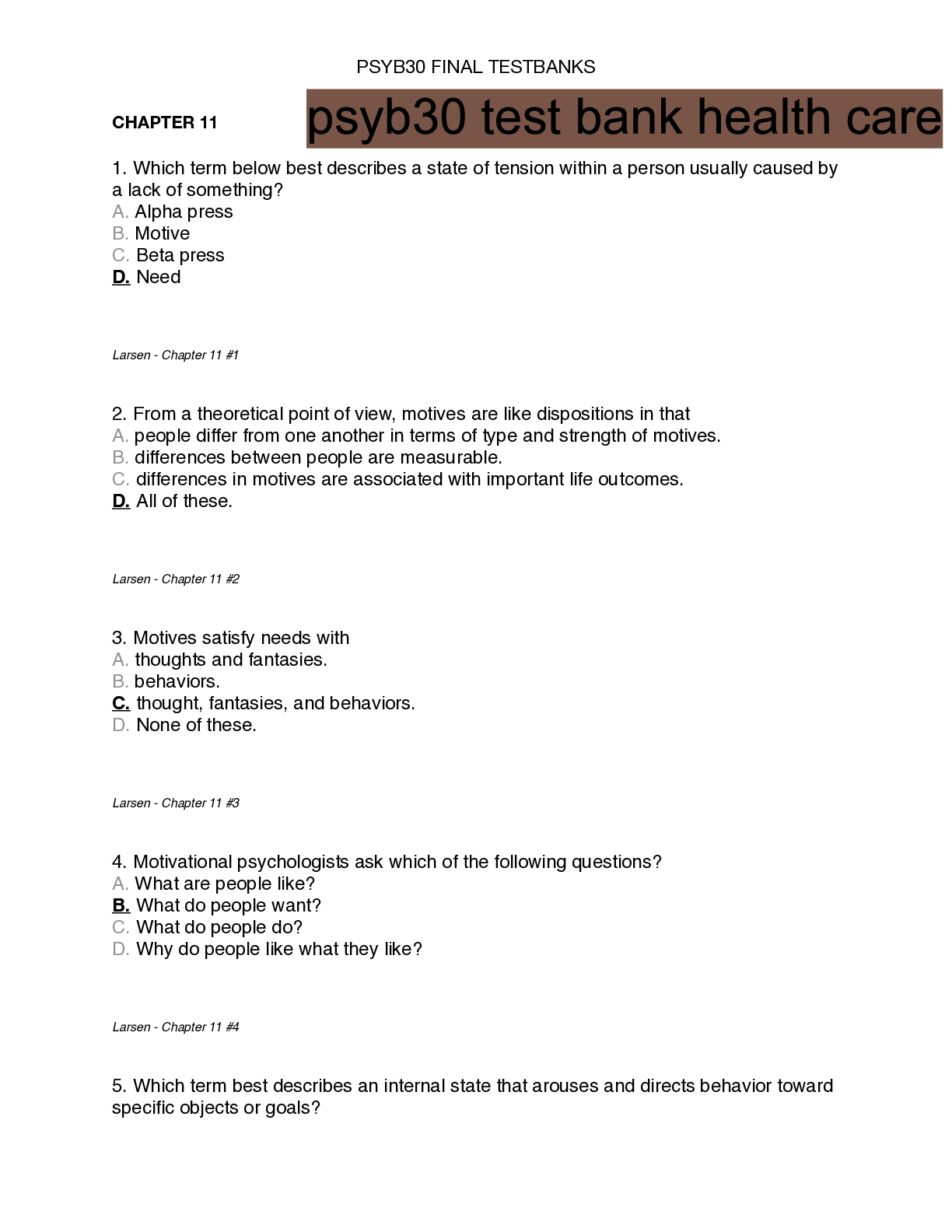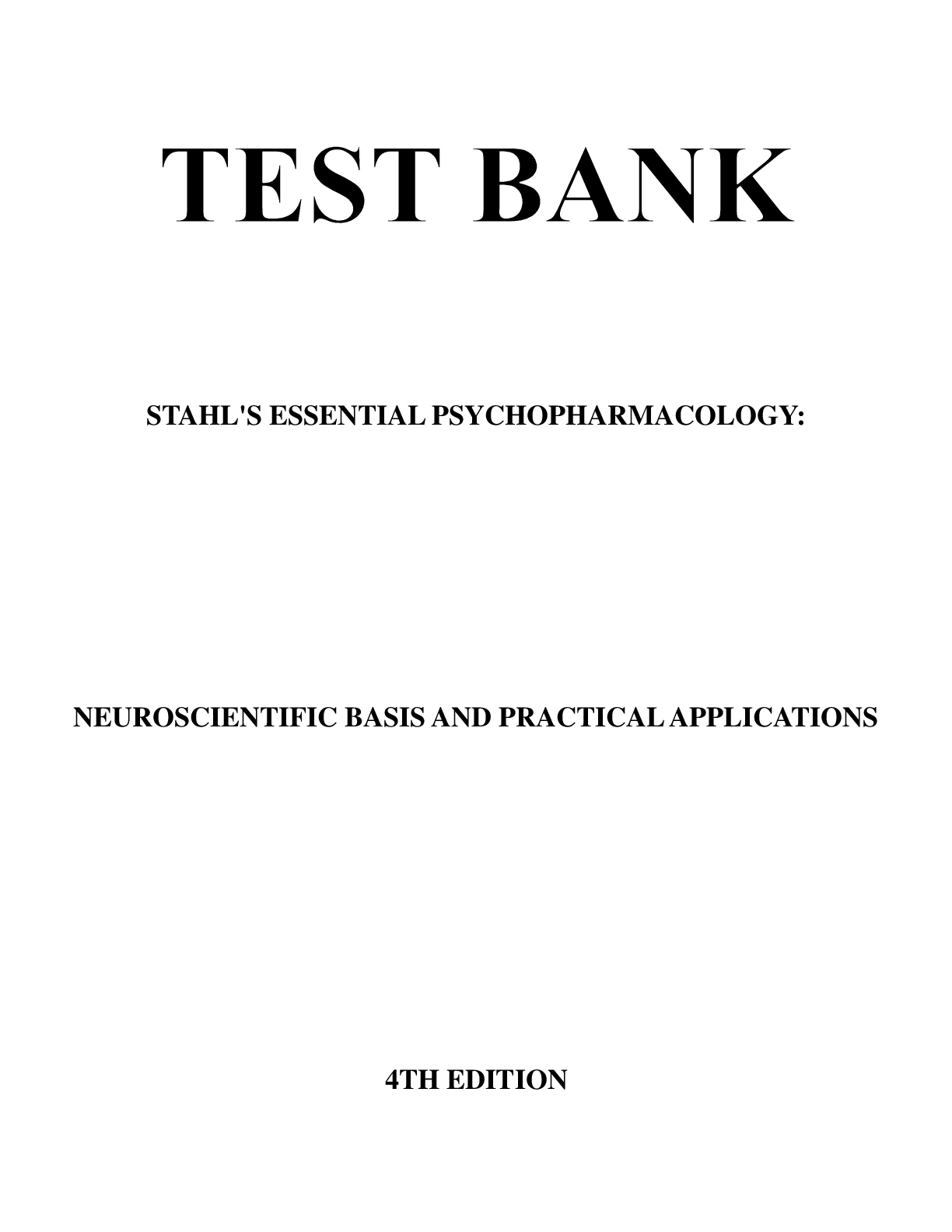*NURSING > QUESTIONS & ANSWERS > Stahl's Essential Psychopharmacology Neuroscientific Basis and Practical Applications TESTBANK/STUDY (All)
Stahl's Essential Psychopharmacology Neuroscientific Basis and Practical Applications TESTBANK/STUDY GUIDE
Document Content and Description Below
1. A patient with depression mentions to the nurse, My mother says depression is a chemical disorder. What does she mean? The nurses response is based on the theory that depression primarily involves ... which of the following neurotransmitters? a. Cortisol and GABA b. COMT and glutamate c. Monamine and glycine d. Serotonin and norepinephrine ANS: D One possible cause of depression is thought to involve one or more neurotransmitters. Serotonin and norepinephrine have been found to be important in the regulation of depression. There is no research to support that the other options play a significant role in the development of depression. 2. A patient has experienced a stroke (cerebral vascular accident) that has resulted in damage to the Broca area. Which evaluation does the nurse conduct to reinforce this diagnosis? a. Observing the patient pick up a spoon b. Asking the patient to recite the alphabet c. Monitoring the patients blood pressure d. Comparing the patients grip strength in both hands ANS: B Accidents or strokes that damage Brocas area may result in the inability to speak (i.e., motor aphasia). Fine motor skills, blood pressure control, and muscle strength are not controlled by the Broca area of the left frontal lobe. 3. The patient diagnosed with schizophrenia asks why psychotropic medications are always prescribed by the doctor. The nurses answer will be based on information that the therapeutic action of psychotropic drugs is the result of their effect on: a. The temporal lobe; especially Wernickes area b. Dendrites and their ability to transmit electrical impulses c. The regulation of neurotransmitters especially dopamine d. The peripheral nervous system sensitivity to the psychotropic medications ANS: C Medications used to treat psychiatric disorders operate in and around the synaptic cleft and have action at the neurotransmitter level, especially in the case of schizophrenia, on dopamine. The Wernickes area, dendrite function, or the sensitivity of the peripheral nervous system are not relevant to either schizophrenia or psychotropic medications. 4. A student nurse mutters that it seems entirely unnecessary to have to struggle with understanding the anatomy and physiology of the neurologic system. The mentor would base a response on the understanding that it is: a. Necessary but generally for psychiatric nurses who focus primarily on behavioral interventions b. A complex undertaking that advance practice psychiatric nurses frequently use in their practice c. Important primarily for the nursing assessment of patients with brain traumacaused cognitive symptoms d. Necessary for planning psychiatric care for all patients especially those experiencing psychiatric disorders ANS: D [Show More]
Last updated: 2 years ago
Preview 1 out of 86 pages

Buy this document to get the full access instantly
Instant Download Access after purchase
Buy NowInstant download
We Accept:

Reviews( 0 )
$11.00
Can't find what you want? Try our AI powered Search
Document information
Connected school, study & course
About the document
Uploaded On
Aug 28, 2021
Number of pages
86
Written in
Additional information
This document has been written for:
Uploaded
Aug 28, 2021
Downloads
0
Views
120

















